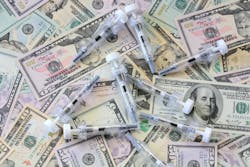Project NextGen selects initial vaccine candidates and awards over $500 million to advance development of vaccines and therapeutics
The U.S. Department of Health and Human Services (HHS), through the Administration for Strategic Preparedness and Response (ASPR), is announcing the selection of initial next-generation vaccine candidates and more than $500 million in awards for Project NextGen – kick-starting planning for Phase 2b clinical trials and technologies that advance innovative next-generation vaccine and therapeutics platforms.
The awards announced:
- $8.5 million to CastleVax for a vector-based intranasal vaccine candidate.
- $10 million to Codagenix for a live-attenuated intranasal vaccine candidate.
- $10 million to Gritstone Bio for a self-amplifying mRNA vaccine candidate.
To support these and all future Project NextGen clinical studies, BARDA is awarding over $240 million, including investments in cold-chain sample management, genomic sequencing, and increased central laboratory capacity for sample testing:
- $87 million to American Type Culture Collection (ATCC) to provide cold-chain and specimen lifecycle management.
- $4 million to BioInfoExperts to provide genomic sequencing of COVID-19.
- $23.2 million to Meso Scale Diagnostics (MSD) to develop and manufacture multiplexed COVID-19 antibody test kits.
- $126.5 million to PPD to provide a central laboratory capacity that analyzes immune responses from samples collected during Project NextGen vaccine clinical trials.
Finally, BARDA is awarding over $241 million to support new technologies that will improve national preparedness for future COVID-19 outbreaks and patient access:
- $40 million to Vir Biotechnology to support the development of mRNA-expressed monoclonal antibodies.
- $100 million to Luminary Labs to administer two competitions focused on incentivizing the development of patches for vaccine delivery and reducing the number of vaccine doses needed for an effective immune response.
- $59 million to ModeX Therapeutics to develop a monoclonal antibody for COVID-19 pre-exposure prophylaxis that can bind to multiple sites on the virus.
- $10.5 million to Charles Stark Draper Laboratory (Draper Labs) to advance the development of tissue chip platform technology.
- $6.1 million to Battelle and $5.8 million to the UK Health Security Agency to advance human lung and airway tissue chip platform technology.
- $20 million to Evidation to test the use of commercial wearables for early respiratory illness detection and a home specimen sampling capability.

